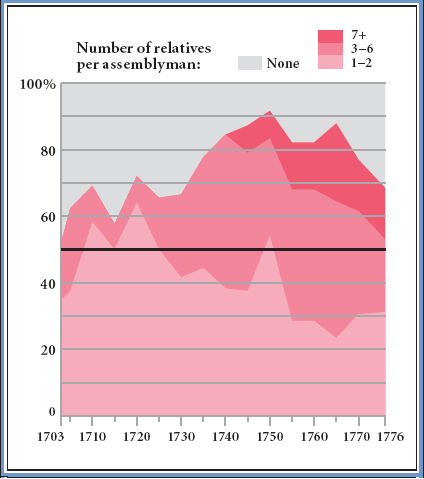The Rise of Colonial Assemblies

After the Glorious Revolution, representative assemblies in America copied the English Whigs and limited the powers of crown officials. In Massachusetts during the 1720s, the assembly repeatedly ignored the king’s instructions to provide the royal governor with a permanent salary, and legislatures in North Carolina, New Jersey, and Pennsylvania did the same. Using such tactics, the legislatures gradually took control of taxation and appointments, angering imperial bureaucrats and absentee proprietors. “The people in power in America,” complained William Penn during a struggle with the Pennsylvania assembly, “think nothing taller than themselves but the Trees.”
Leading the increasingly powerful assemblies were members of the colonial elite. Although most property-owning white men had the right to vote, only men of wealth and status stood for election. In New Jersey in 1750, 90 percent of assemblymen came from influential political families (Figure 3.3). In Virginia, seven members of the wealthy Lee family sat in the House of Burgesses and, along with other powerful families, dominated its major committees. In New England, affluent descendants of the original Puritans formed a core of political leaders. “Go into every village in New England,” John Adams wrote in 1765, “and you will find that the office of justice of the peace, and even the place of representative, have generally descended from generation to generation, in three or four families at most.”
However, neither elitist assemblies nor wealthy property owners could impose unpopular edicts on the people. Purposeful crowd actions were a fact of colonial life. An uprising of ordinary citizens overthrew the Dominion of New England in 1689. In New York, mobs closed houses of prostitution; in Salem, Massachusetts, they ran people with infectious diseases out of town; and in New Jersey in the 1730s and 1740s, mobs of farmers battled with proprietors who were forcing tenants off disputed lands. When officials in Boston restricted the sale of farm produce to a single public market, a crowd destroyed the building, and its members defied the authorities to arrest them. “If you touch One you shall touch All,” an anonymous letter warned the sheriff, “and we will show you a Hundred Men where you can show one.” These expressions of popular discontent, combined with the growing authority of the assemblies, created a political system that was broadly responsive to popular pressure and increasingly resistant to British control.
IDENTIFY CAUSES